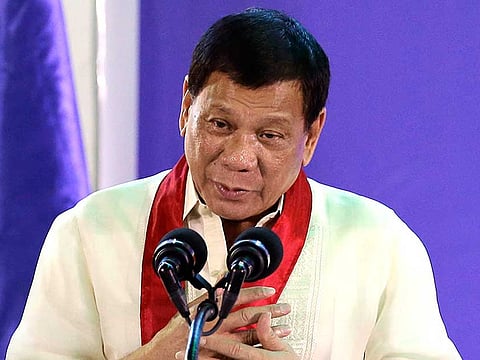Duterte signs law streamlining bureaucracy
New law seen to result in faster transactions with government

Manila: Philippines President Rodrigo Duterte has signed a law that aims at addressing the tedious and unnecessary requirements in people’s dealings with the government.
Called the ‘Ease of Doing Business and Efficient Government Service Delivery Act of 2018’, the new law, which will be implemented in weeks to come, essentially lessens the number of approving agencies involved in permits and clearances and aims to cut bureaucratic hurdles.
“This law will introduce simplified requirements and streamline procedures that will finally spare our people from the intolerable waiting time and long lines in front line government agencies,” Duterte said. The Ease of Doing Business Law has been long overdue, he said.
Supplements Anti-Red Tape Act
The Act supplants the Anti-Red Tape Act of 2007 enacted during the administration of president Gloria Arroyo, which is said to have failed in addressing concerns over bureaucracy in government institutions.
One of the salient features of the law is the standardisation of the processing time for government transactions, a statement issued by the presidential palace said.
“Under the new law, government agencies are required to process simple transactions within three working days and complex transactions in seven working days and highly technical transactions in 20 working days,” the palace said.
It will also limit to a maximum of three the number of signatories for applications for licences, clearances, permits, certifications and authorisations. Previously under the Anti-Red Tape Act of 2007, the number of officials who signed such documents was at least five.
‘One-stop facility’
Under the naw, electronic signatures will also be recognised and a “zero-contact” policy will be implemented to avoid improprieties such as bribing officials or functionaries to facilitate quick transactions.
On the part of local government entities, the new law now requires them to automate their business permit and licensing systems and to set up “one-stop” business facilitation services and to use online unified business application forms.
The expected improvements in easing bureaucracy were the result of procedures spelt out by the Department of Information and Communications Technology to automate business-related transactions through Web-based software and technological platforms.
Duterte said one of the priorities of the administration’s Ten-Point Socio-Economic Agenda is to encourage competitiveness and improve overall business environment.
“We intend to accomplish that by promoting integrity, accountability and good governance in all government transactions,” he said.
Bureaucracy is perceived to have been a major source of corruption in government where unscrupulous “fixers” would charge extra for facilitating faster transactions with government agencies resulting in longer waiting times for other people.
“By automating our bureaucratic processes and integrating online mechanisms in day-to-day transactions, we do not just bring our people closer to their government, but also forge a vibrant and productive relationship that will redound to the benefit of the people,” Duterte said.



